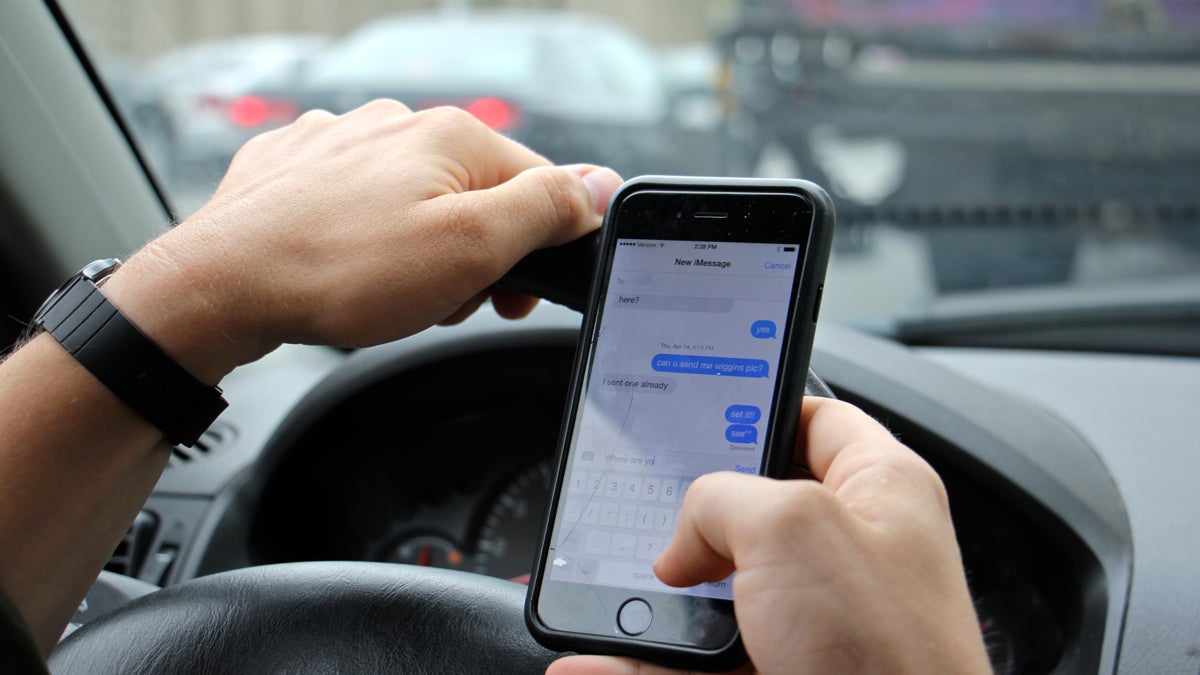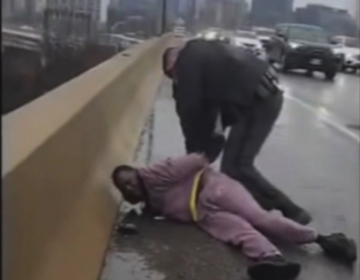Should texters be held liable if messages distract driver, contribuiting to crash?
Listen
(Emma Lee/WHYY)
Can you be in legal trouble for sending a text message that distracts a driver before an accident? Maybe so, according to a judge in Western Pennsylvania who recently ruled on a case there.
The ruling has raised a question for personal injury attorneys across the state: Might the opinion open the door for more lawsuits against texters?
The issue centers on a wrongful death civil lawsuit out of Lawrence County, where Court of Common Pleas Judge John Hodge allowed two men to be added as defendants. They were supposedly texting with a driver before she fatally struck a man on a motorcycle.
“If you are sending texts to a person which in turn is contributing to them being distracted, why shouldn’t you be held liable?” said attorney Doug Olcott, who filed the suit on behalf of the victim’s family.
In 2013, a New Jersey appeals court held that knowingly texting a driver could be enough to sue the texter. But the court said the key is that the texter had to have a “special reason to know” the recipient of the text was behind the wheel. The Pennsylvania judge cited the case in his opinion.
“As far as we can tell, these are now the only two opinions in the country that have addressed this issue,” Olcott said.
While the ruling is limited to this one case, if an appeals court takes up a similar dispute and affirms the New Jersey standard, having a strong case will mean clearing a tall hurdle.
“We don’t want people running around thinking, ‘My gosh, I sent a text, and now someone is going to sue me for it.’ The standard is, we have to be able to show that he knew or should’ve known that she was driving, and that she would’ve responded while driving,” Olcott said.
The defense attorneys in the wrongful death suit are not fighting the judge’s opinion, though they will have an opportunity to appeal to Superior Court at the conclusion of the civil trial.
In May 2014, driver Laura Gargiulo was sentenced to up to two years in jail after pleading guilty to involuntary manslaughter and other charges.
The judge presiding over the civil suit wrote that there is no precedent in Pennsylvania that specifically deals with how responsible the sender of a text message is in distracting a driver. A jury will decide how culpable the texter is in the Lawrence County case.
Philadelphia personal injury attorney Heidi Villari said until a state appeals court rules on a case — or until state lawmakers pass a law targeting people who shoot off messages to motorists — such cases will be decided one by one.
“The courts are pushing back on the strong-willed texters out there that are refusing to actually follow the law,” Villari said. “What you’ll ultimately find is that more people will in fact get sued for participation in texting, even if they’re the non-driver.”
Under Pennsylvania law, texting while driving is illegal, punishable as a summary offense with a fine of $50, in addition to court costs and other fees. A proposal has been introduced in the state Senate to stiffen penalties for people who text while driving.
In 2015, 14,810 crashes across Pennsylvania involved a distracted driver, accounting for about 8 percent of all wrecks. And 61 people died as a result of those accidents caused by distracted drivers.
Most states have passed anti-texting laws in an effort to curb distracting driving, but enforcement has been dicey.
Carmakers are reportedly testing out artificial intelligence systems to monitor whether drivers are too distracted to drive. And there have been other efforts, to test technology for blocking incoming and outgoing text messages from reaching drivers.
In Philadelphia, attorney Villari said upholding a texter as liable for injuries caused by a driver who is distracted could deter future texting in similar situations.
“So the next time the non-driving texter is on the phone with the driver, he or she learns, ‘Oh you’re driving? OK, I’ll stop, let me know when you’re done,'” Villari said.
As Olcott adds, there’s a two-way responsibility in texting.
“Certainty the driver of the vehicle has the ultimate ability to sit there and not respond,” he said.
WHYY is your source for fact-based, in-depth journalism and information. As a nonprofit organization, we rely on financial support from readers like you. Please give today.




